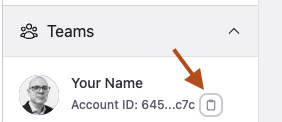🪲 Report Issues or Bugs to Support
If you encounter issues while using Tatum, follow this guide to ensure faster resolution. Providing the right details upfront helps our support team diagnose and resolve problems efficiently.
Steps
Step_1: Stay Updated
Before reporting an issue, ensure you are using the latest version of:
- Tatum JS SDK
- Tatum KMS
Many issues are resolved in newer releases, so updating might fix the problem without needing support.
Step_2: Fetch Your Account Information
Find your Account_ID in the Tatum Dashboard (bottom left corner).

Tatum Dashboard Left Corner
Step_3: Provide a Clear Issue Description
When contacting support, include a concise yet detailed issue description. A well-structured report helps the team quickly diagnose and resolve the problem.
How to Format Your Issue Report
-
Problem Statement: Clearly describe what went wrong.
- ✅ Example: "When attempting to withdraw funds from a Virtual Account, the transaction fails with a
400 Bad Requesterror." - ❌ Avoid: "The API doesn't work."
- ✅ Example: "When attempting to withdraw funds from a Virtual Account, the transaction fails with a
-
Expected Outcome: Explain what you expected to happen.
- ✅ Example: "I expected the withdrawal to be processed and see a transaction hash returned."
-
Steps to Reproduce: List the exact actions taken before encountering the issue.
- API Endpoint/Method Used:
/v3/offchain/withdrawal - Payload Sent (if applicable):
{ "senderAccountId": "12345", "amount": "0.5", "address": "0xabc123...", "signatureId": "67890" } - Response Received:
"error": "Invalid senderAccountId"
- API Endpoint/Method Used:
-
What You've Tried: Share any troubleshooting steps you’ve already taken.
- ✅ Example: "I confirmed the sender account exists, and tested a different withdrawal amount."
NoteProviding a structured issue report ensures the support team can investigate efficiently and provide faster resolution.
Step_4: Find Out What Specific Information Support Needs to Troubleshoot
Disclaimer: Third-Party Code
Tatum staff does not review, debug, or evaluate third-party code. Support is strictly limited to Tatum REST API calls, methods, or the Tatum JS SDK.
Before Contacting Support
- Test our API endpoints in a standalone environment like Postman.
- If the issue persists, provide detailed logs and request payloads.
- For integration-related assistance beyond Tatum's scope, we recommend consulting with experienced developers.
Discharge of Responsibility
Your privateKey(s) andmnemonics/seed phrases must remain confidential and secure at all times.
Warning
- Never share your private keys or mnemonics with anyone.
- If exposed, you will lose control of your assets permanently.
- Tatum staff will NEVER request your private keys or mnemonics. If someone asks for them, assume it is a scam and report it immediately.
Your security is your responsibility. Protect your credentials to prevent unauthorized access.
Bug Bounty Program
Currently, Tatum does not have an active bug bounty program. However, we greatly appreciate reports of potential vulnerabilities.
While we do not offer formal rewards, we are committed to addressing reported issues promptly. Should a bug bounty program be introduced in the future, we will update our documentation accordingly.
Understanding the Scope of Support
Tatum provides developer tools for blockchain application development. Users are expected to have a general to advanced understanding of blockchain concepts.
📚 Need to learn blockchain fundamentals?
Explore external learning platforms before reaching out to Tatum Support.
Before Contacting Support, Ensure You Have:
- Reviewed documentation related to your issue.
- Checked error messages and logs for possible misconfigurations.
- Verified your API requests in an isolated test environment.
Providing detailed, accurate information allows our team to respond efficiently and resolve your issue faster.
Updated 3 months ago